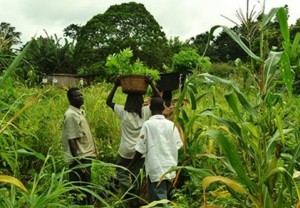Investments and application of technology said to be crucial for agriculture
 Mr Festus Kwadzokpo, Capacity Building Coordinator of US Agency for International Development (USAID) Feed the Future Agriculture Support Project, has said enhanced investment, institutional coordination and application of science and technology in agriculture was crucial for the growth of the economy.
Mr Festus Kwadzokpo, Capacity Building Coordinator of US Agency for International Development (USAID) Feed the Future Agriculture Support Project, has said enhanced investment, institutional coordination and application of science and technology in agriculture was crucial for the growth of the economy.
Mr Kwadzokpo said this at a public education and sensitization forum on Ghana’s Agriculture Policy (FASDEP II) and its implementation plan, the Medium-Term Agriculture Sector Investment Plan (METASIP) for major actors in Kpando on Tuesday.
The intervention is collaboration between Government of Ghana/USAID Feed the Future Agriculture Policy Support.
It is a five-year programme aimed to improve the security-enabling environment for private sector investment in agriculture.
Mr Kwadzokpo said the implementation of the METASIP project would reduce vulnerabilities, sustain productivity and safeguard food security for local consumption and for exports.
He said by the implementation plan, Metropolitan, Municipal and District Assemblies, the Department of Agriculture, the private sector, farmer-based organisations, civil society groups and development partners were central.
The Coordinator said the programme was to achieve a targeted agricultural gross domestic product (GDP) of at least six percent annually, halving poverty by 2015 in consonance with MDG 1 and based on government’s expenditure allocation of at least 10 percent.
Mr Yakubu Iddrisu, Policy Advocacy Specialist at the USAID, said METASIP was to provide an integrated framework to support agricultural growth and rural development.
He said priority areas under the scheme include extension services, land reforms, new technologies, rural finance and infrastructure, research and development and input and output markets towards transforming the sector to becoming the backbone for wealth creation.
Mrs Cecilia Gboloo, Kpando Municipal Director of Agriculture, said its investment potential areas include commercial cultivation and processing of cassava as cake for the breweries, glucose syrup, chips and high quality flour in addition to vegetable production based on availability of water from the Volta Lake, River Dayi and other pockets of seasonal streams.
She said investments in fisheries and cash crops are plausible from its large hectares of arable land, available labour, accessible road networks and 24 functional farmer-based organisations (FBOs) and other entities.
Mrs Gboloo enumerated challenges to the sector as inadequate support for irrigation infrastructure and tractor services, no mechanisation centres, inadequate and irregular flow of funds, high interest rates and non-availability of storage structures.
Mrs Paulina Adinyirah, the Kpando Municipal Chief Executive, said the workshop was timely as it would guide stakeholders to understand the policy and forge a way-forward towards reengineering the agricultural sector to stem food insecurity and increased incomes.
At an interactive section, participants insisted tackling the menace of perennial bushfires and the Fulani herdsmen nuisance would be the panacea for implementing the contents of the FASDEP and METASIP policies for progress.
Source: GNA
